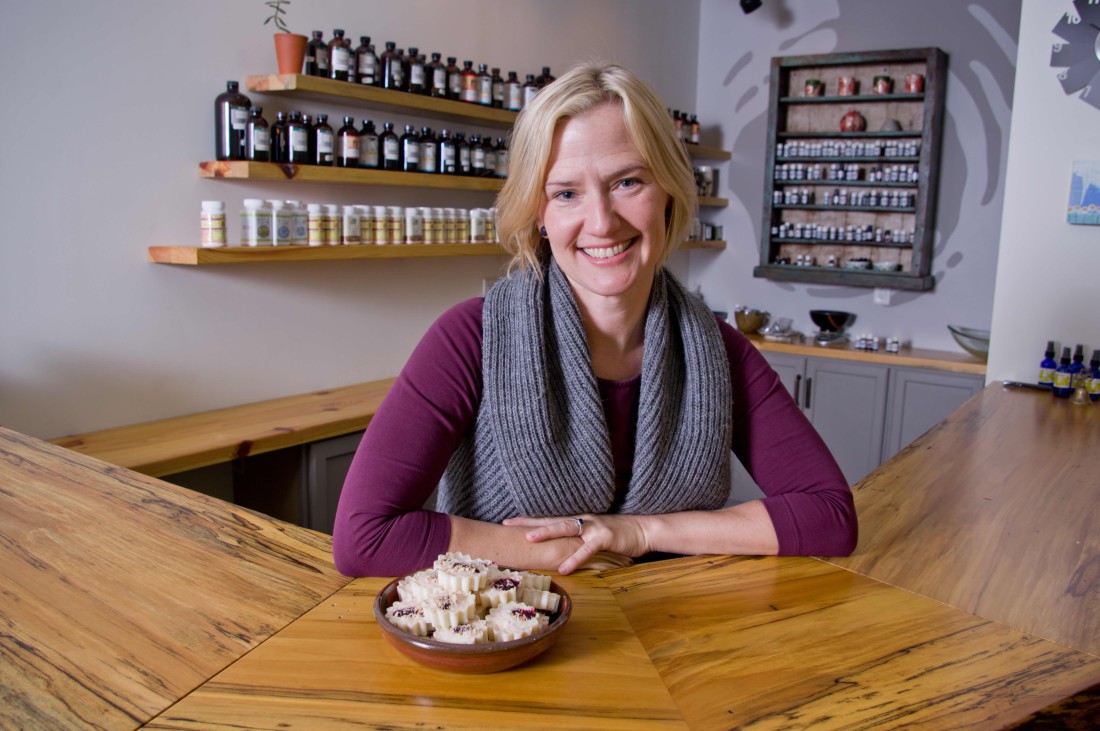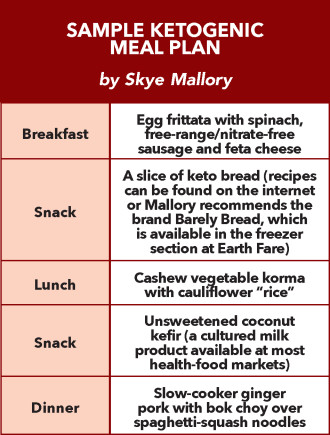The high-fat, moderate-protein, low-carbohydrate ketogenic diet has been steadily gaining in popularity both locally and nationally as a weight-loss strategy as well as a way to manage specific health issues, but it’s not for everyone, say Asheville nutrition experts. The goal is to receive the bulk of caloric intake through fresh vegetables and healthy fats such as coconut, avocado, olives, nuts and seeds, eggs and meat, which causes the body to shift to a state of ketosis, where it burns fat instead of carbohydrates for energy.
Skye Mallory, an acupuncturist at Clasique Acupuncture & Pilates Studio, says recommending the diet to a client is similar to prescribing a pharmaceutical. “The idea that food is actually a way that you would treat yourself is not odd,” she says. “Just like you would want to take the right prescription medication, you want to make sure you’re eating in a way that promotes health. I don’t always put people on the keto diet for the simple reason that just like every person needs different medication, every person needs different types of foods to optimize their health.
“Whenever you consume a lot of fat, in particular, it is very soothing to your nervous system,” says Mallory, who personally follows the diet to help treat her Type 1 diabetes, an autoimmune condition in which the pancreas produces insufficient insulin. “Whenever you’re on a diet where you eat a little bit of everything, you’re naturally taking in a huge range of nutrients. But on keto, because you are cutting out huge chunks of foods, you have to be more conscientious about how you’re supplementing your diet. For people who don’t cook much or aren’t willing to plan meals to make sure it’s varied, it’s not a great diet.”
Taft Draper, a local registered dietitian, uses the keto diet with his clients on a case-by-case basis, taking into account lifestyle and genetics. “I include it in my practice and get good results, but it is not a cure-all for everyone. The KD has many benefits, but I would recommend seeking a qualified practitioner in order to address any deficiencies and adverse symptoms,” he says. Draper has employed the keto diet in his practice as part of patient treatment protocol for Type 2 diabetes, polycystic ovary syndrome, neurological disorders (including Alzheimer’s and Parkinson’s), heart disease, obesity, cancer and traumatic brain injuries.
When working with a patient who is following the keto diet, Draper monitors for adverse effects. “I am mostly concerned with nutrient deficiencies, low pH levels and irritability. Therefore, I give supplements to prevent deficiencies, increase pH, and to stabilize one’s mood,” he says.
Registered dietitian Traci Malone explains that the keto diet offers benefits in some cases but does not recommend it for the general population. “Overall, I would say that there is some evidence that following a diet that induces ketosis may be beneficial for some people, specifically those affected by neurological disorders such as epilepsy. However, for the general population, I feel this diet is too restrictive and creates too many food rules that would make it difficult to maintain for any real length of time,” says Malone.
“There are potential adverse reactions to the ketogenic diet, including nutrient deficiencies, constipation and kidney issues, to name just a few. Also, often overlooked is the psychological harm that can come from following such a rigid diet plan, as little to no grain-based foods (i.e. breads, pasta, crackers, rice, quinoa and more), fruit, many vegetables, beans/legumes and dairy are off-limits to keep carbohydrate intake low enough to produce ketosis,” says Malone.
Mallory explains that one should know within a few weeks whether the diet is advantageous. “I think there is a lot of validity to noticing how you feel. If you are doing the keto diet properly, you should feel great, so you’re really motivated to stay with it,” she says. “If you don’t feel good, and you’re like, ‘Oh, I’ve just been feeling terrible ever since I started the keto diet three weeks ago,’ it’s probably not good for you for one reason or another. It may be how you’re practicing it, or it may be the diet itself.”
Ultimately, even if going keto benefits your health, the regimen can still be difficult to follow, especially for vegetarians or vegans who rely on starchy grains, tubers and legumes. And for omnivorous diners, Mallory warns that it’s not all about eating meat. “Because it’s a high-fat diet and not a high-protein diet, you’re going to be eating mostly vegetables,” she says. “A lot of times when you say low-carb, people automatically think of protein, but that’s not what this diet is about. The bulk of it will be nonstarchy vegetables.”
There is a meetup group in Asheville that can offer support — WNC Ketogenic Lifestyle Support Group at meetup.com. And, as for eating out in Western North Carolina, Mallory recommends establishments that offer modest portions of fresh vegetables in tapas form — such as Cúrate, En La Calle, Limones or Zambra — or sides that can be combined to create a diet-friendly meal. Mallory notes the zucchini noodles at Nine Mile and the lettuce tacos at Bartaco as examples of specific dishes that work well with the diet.





Before you comment
The comments section is here to provide a platform for civil dialogue on the issues we face together as a local community. Xpress is committed to offering this platform for all voices, but when the tone of the discussion gets nasty or strays off topic, we believe many people choose not to participate. Xpress editors are determined to moderate comments to ensure a constructive interchange is maintained. All comments judged not to be in keeping with the spirit of civil discourse will be removed and repeat violators will be banned. See here for our terms of service. Thank you for being part of this effort to promote respectful discussion.